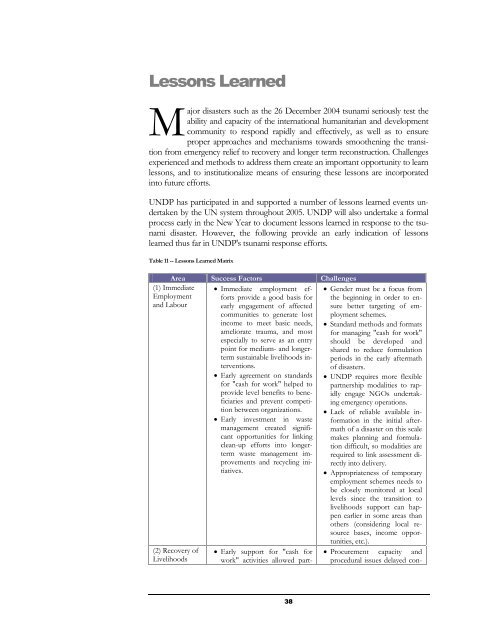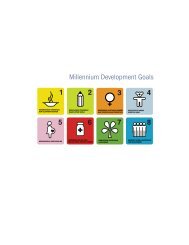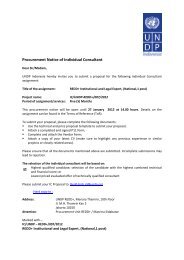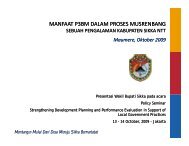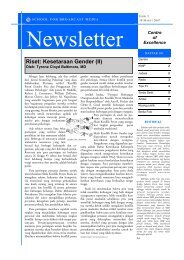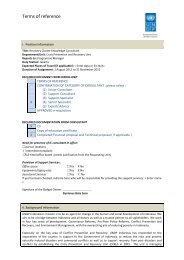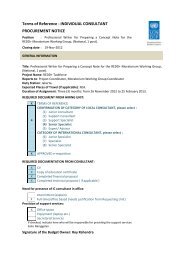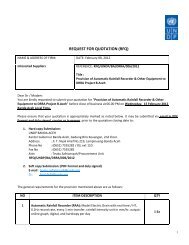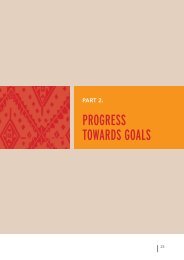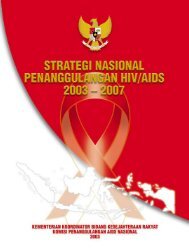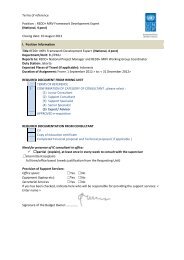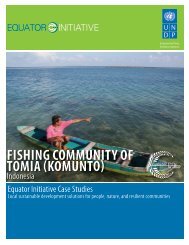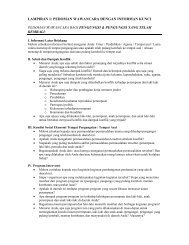Aceh Emergency Response and Transitional Recovery ... - UNDP
Aceh Emergency Response and Transitional Recovery ... - UNDP
Aceh Emergency Response and Transitional Recovery ... - UNDP
Create successful ePaper yourself
Turn your PDF publications into a flip-book with our unique Google optimized e-Paper software.
Lessons LearnedMajor disasters such as the 26 December 2004 tsunami seriously test theability <strong>and</strong> capacity of the international humanitarian <strong>and</strong> developmentcommunity to respond rapidly <strong>and</strong> effectively, as well as to ensureproper approaches <strong>and</strong> mechanisms towards smoothening the transitionfrom emergency relief to recovery <strong>and</strong> longer term reconstruction. Challengesexperienced <strong>and</strong> methods to address them create an important opportunity to learnlessons, <strong>and</strong> to institutionalize means of ensuring these lessons are incorporatedinto future efforts.<strong>UNDP</strong> has participated in <strong>and</strong> supported a number of lessons learned events undertakenby the UN system throughout 2005. <strong>UNDP</strong> will also undertake a formalprocess early in the New Year to document lessons learned in response to the tsunamidisaster. However, the following provide an early indication of lessonslearned thus far in <strong>UNDP</strong>'s tsunami response efforts.Table 11 -- Lessons Learned MatrixArea Success Factors Challenges• Immediate employment effortsprovide a good basis forearly engagement of affectedcommunities to generate lostincome to meet basic needs,ameliorate trauma, <strong>and</strong> mostespecially to serve as an entrypoint for medium- <strong>and</strong> longertermsustainable livelihoods interventions.• Early agreement on st<strong>and</strong>ardsfor "cash for work" helped toprovide level benefits to beneficiaries<strong>and</strong> prevent competitionbetween organizations.• Early investment in wastemanagement created significantopportunities for linkingclean-up efforts into longertermwaste management improvements<strong>and</strong> recycling initiatives.(1) ImmediateEmployment<strong>and</strong> Labour(2) <strong>Recovery</strong> ofLivelihoods• Early support for "cash forwork" activities allowed part-• Gender must be a focus fromthe beginning in order to ensurebetter targeting of employmentschemes.• St<strong>and</strong>ard methods <strong>and</strong> formatsfor managing "cash for work"should be developed <strong>and</strong>shared to reduce formulationperiods in the early aftermathof disasters.• <strong>UNDP</strong> requires more flexiblepartnership modalities to rapidlyengage NGOs undertakingemergency operations.• Lack of reliable available informationin the initial aftermathof a disaster on this scalemakes planning <strong>and</strong> formulationdifficult, so modalities arerequired to link assessment directlyinto delivery.• Appropriateness of temporaryemployment schemes needs tobe closely monitored at locallevels since the transition tolivelihoods support can happenearlier in some areas thanothers (considering local resourcebases, income opportunities,etc.).• Procurement capacity <strong>and</strong>procedural issues delayed con-38


